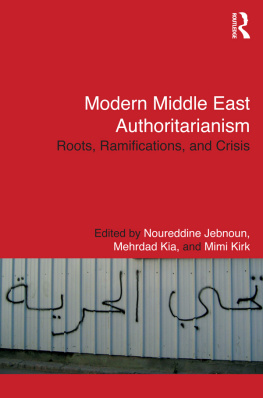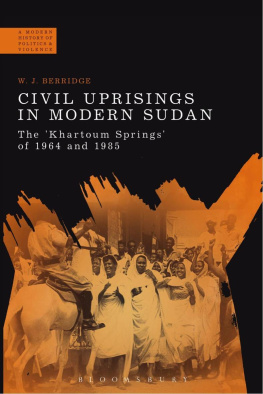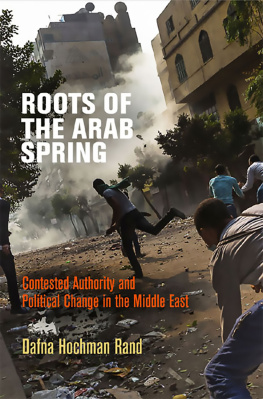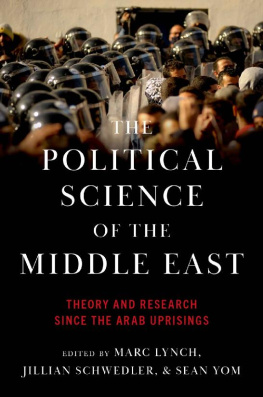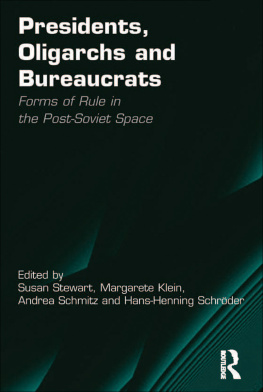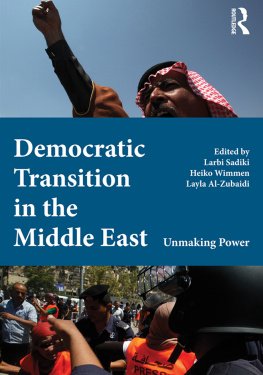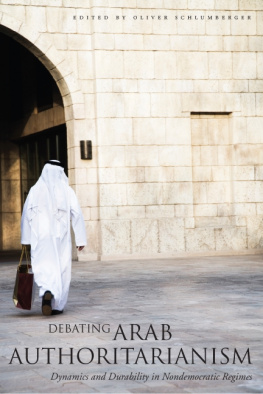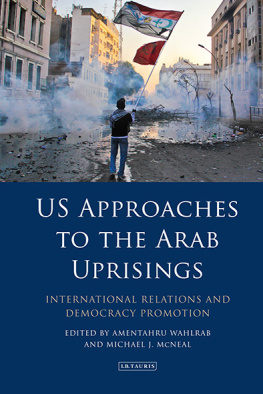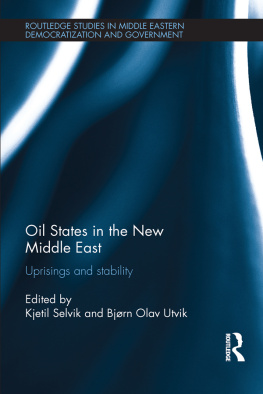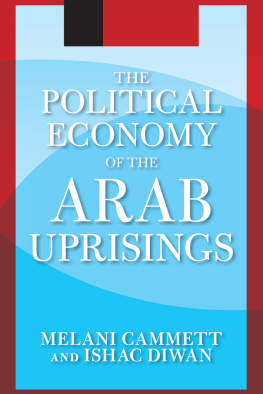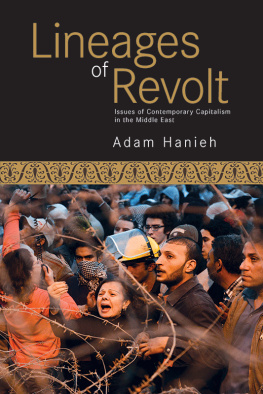Modern Middle East Authoritarianism
While the Arab uprisings have overturned the idea of Arab exceptionalism, or the acceptance of authoritarianism, better analysis of authoritarianism's resilience in pre- and post-uprising scenarios is still needed. Modern Middle East Authoritarianism: Roots, Ramifications, and Crisis undertakes this task by addressing not only the mechanisms that allowed Middle Eastern regimes to survive and adapt for decades, but also the obstacles that certain countries face in their current transition to democracy.
This volume analyzes the role of ruling elites, Islamists, and others, as well as variables such as bureaucracy, patronage, the strength of security apparatuses, and ideological legitimacy to ascertain regimes' life expectancies and these factors' post-uprisings repercussions. Discussing not only the paradigms through which the region has been analyzed, but also providing in-depth case studies of Tunisia, Egypt, Libya, Algeria, Saudi Arabia, Iraq, and Iran, the authors arrive at critical conclusions about dictatorship and possibilities for its transformation.
Employing diverse research methods including interviews, participant observation, and theoretical discussions of authoritarianism and political transition, this book is essential reading for scholars of Middle East studies, Islamic studies, and those with an interest in the governance and politics of the Middle East.
Noureddine Jebnoun is a faculty member at Georgetown University's Center for Contemporary Arab Studies, where his teaching interests focus on governance and security challenges of the Arab Middle East and North Africa. He is the author of L'espace mditerranen: les enjeux de la coopration et de la scurit entre les rives nord et sud l'aube du XXIme sicle (2003), as well as many book chapters and articles.
Mehrdad Kia is Director of the Central and Southwest Asian Studies Center and a professor of Middle Eastern and North African history at the University of Montana. Kia has published extensively on the intellectual and cultural history of nineteenth-century Iran, as well as the history of the Ottoman Empire. His most recent books are The Ottoman Empire (2008) and Daily Life in the Ottoman Empire (2011), both published by Greenwood.
Mimi Kirk is Research Director at the Middle East Institute in Washington, D.C. Her other co-edited volumes include Palestine and the Palestinians in the Twenty-first Century (2013); Uncovering Iraq: Trajectories of Disintegration and Transformation (2011); and Industrialization in the Gulf: A Socioeconomic Revolution (2009). Her writing has appeared in Middle East Report, Jadaliyya, and the Atlantic.
Routledge Studies in Middle Eastern Politics
Algeria in Transition
Reforms and development prospects
Ahmed Aghrout with Redha M. Bougherira
Palestinian Refugee Repatriation
Global perspectives
Edited by Michael Dumper
The International Politics of the Persian Gulf
A cultural genealogy
Arshin Adib-Moghaddam
Israeli Politics and the First Palestinian Intifada
Political opportunities, framing processes and contentious politics
Eitan Y. Alimi
Democratization in Morocco
The political elite and struggles for power in the post-independence state
Lise Storm
Secular and Islamic Politics in Turkey
The making of the Justice and Development Party
mit Cizre
The United States and Iran
Sanctions, wars and the policy of dual containment
Sasan Fayazmanesh
Civil Society in Algeria
The political functions of associational life
Andrea Liverani
JordanianIsraeli Relations
The peacebuilding experience
Mutayyam al O'ran
Kemalism in Turkish Politics
The Republican People's Party, secularism and nationalism
Sinan Ciddi
Islamism, Democracy and Liberalism in Turkey
The case of the AKP
William Hale and Ergun zbudun
Politics and Violence in Israel/Palestine
Democracy versus military rule
Lev Luis Grinberg
Intra-Jewish Conflict in Israel
White Jews, black Jews
Sami Shalom Chetrit
Holy Places in the IsraeliPalestinian Conflict
Confrontation and co-existence
Edited by Marshall J. Breger, Yitzhak Reiter and Leonard Hammer
Plurality and Citizenship in Israel
Moving beyond the Jewish/Palestinian civil divide
Edited by Dan Avnon and Yotam Benziman
Ethnic Politics in Israel
The margins and the Ashkenasi Center
As'ad Ghanem
Islamists and Secularists in Egypt
Opposition, conflict and cooperation
Dina Shehata
Political Succession in the Arab World
Constitutions, family loyalties and Islam
Anthony Billingsley
Turkey's Entente with Israel and Azerbaijan
State identity and security in the Middle East and Caucasus
Alexander Murinson
Europe and Tunisia
Democratization via association
Brieg Powel and Larbi Sadiki
Turkish Politics and the Rise of the AKP
Dilemmas of institutionalization and leadership strategy
Arda Can Kumbaracibasi
Civil Society and Democratization in the Arab World
The dynamics of activism
Francesco Cavatorta and Vincent Durac
Politics in Morocco
Executive monarchy and enlightened authoritarianism
Anouar Boukhars
The Second Palestinian Intifada
Civil resistance
Julie M. Norman
Democracy in Turkey
The impact of EU political conditionality
Ali Resul Usul
Nationalism and Politics in Turkey
Political Islam, Kemalism and the Turkish issue
Edited by Marlies Casier and Joost Jongerden
Democracy in the Arab World
Explaining the deficit
Edited by Samir Makdisi and Ibrahim Elbadawi
Public Management in Israel
Development, structure, functions and reforms
Itzhak Galnoor
Israeli Nationalism
Social conflicts and the politics of knowledge
Uri Ram
NATO and the Middle East
The geopolitical context post-9/11
Mohammed Moustafa Orfy
The Kurds and US Foreign Policy
International relations in the Middle East since 1945
Marianna Charountaki
The IranIraq War
Antecedents and conflict escalation
Jerome Donovan
Surveillance and Control in Israel/Palestine
Population, territory and power
Edited by Elia Zureik, David Lyon and Yasmeen Abu-Laban
Conflict and Peacemaking in Israel-Palestine
Theory and application
Sapir Handelman
Arab Minority Nationalism in Israel
The politics of indigeneity
Amal Jamal
The Contradictions of Israeli Citizenship
Land, religion and state
Edited by Guy Ben-Porat and Bryan S. Turner
The Arab State and Women's Rights
The trap of authoritarian governance
Elham Manea
Saudi Maritime Policy
Integrated governance
Hatim Al-Bisher, Selina Stead and Tim Gray
The Arab State
Dilemmas of late formation
Adham Saouli
Regime Stability in Saudi Arabia
The challenge of succession
Stig Stenslie
Sacred Space in Israel and Palestine
Religion and politics
Edited by Marshall J. Breger, Yitzhak Reiter and Leonard Hammer
The UN and the ArabIsraeli Conflict
American hegemony and UN intervention since 1947

